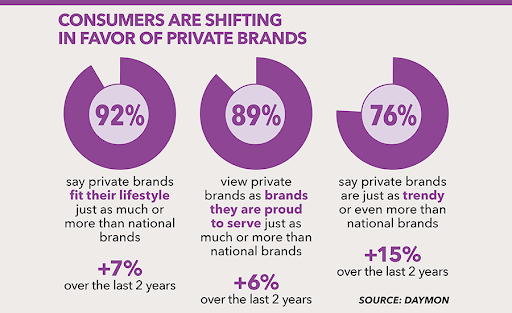Picture this: A customer walks into a supermarket, scanning the shelves for their preferred laundry detergent. They notice a familiar national brand, but their attention is quickly drawn to a similarly packaged product with a sleek design, interesting fragrance, and an inviting price point. Intrigued, the customer decides to give it a try. This is a perfect example of a private label brand in action.
The rise of private labels in retail has been nothing short of impressive, with the market share for private label products increasing to nearly 18% in the US in 2021. More and more retailers are turning to private label brands to offer consumers a competitive alternative to national brands while boosting their profit margins.
But why is this trend gaining traction, and how can it benefit retailers in the long run?
In this article, we’ll delve into the importance of having a private label brand and how it can help retailers stand out in an increasingly crowded marketplace.
What is a Private Label Brand?
A private label brand, often referred to as a “store brand,” is a unique product line created and owned by a retailer. These brands are exclusively sold at the retailer’s outlets and are typically designed to compete with well-established national brands.
Successful private labels come in various forms, from clothing and electronics to groceries and beauty products. For instance,
- Amazon’s “AmazonBasics” line offers budget-friendly essentials.
- Target’s “Threshold” brand focuses on stylish yet affordable home goods.
- Grocery stores such as Trader Joe‘s have also made a name for themselves by offering high-quality, private label products at competitive prices.
- Kroger has private label brands, such as SimpleTruth, Private Selection, Home Chef, and many others. These private label brands led the sales for grocery store chains with 10.1% year-over-year growth in Q4 2022. The company revealed that its annual private label business surpassed $26.2 billion in revenue for the year 2020.
- Overstock.com has launched 17 private label brands, with more than 16,000 products providing customers a match on styles, trends, and budgets.
In essence, private label brands are a strategic way for retailers to cater to different customer segments, diversify their offerings, and ultimately enhance their bottom line.
The Importance of Creating a Private Label Brand for Retail Businesses
In today’s competitive retail landscape, having a private label brand is essential for various reasons, such as improved profit margins, enhanced customer loyalty, and increased control over product offerings. It’s a proven way to bring customers back into your retail location.
Let’s explore the importance of private label brands, which will help your retail business decide on creating one of your own.
1) Establishing a Unique Identity
Creating a private label brand empowers your retail business to establish its unique identity. Instead of depending solely on national brands, you have the opportunity to develop products that reflect your company’s values and cater to specific customer needs. This sets you apart from competitors and provides customers with a compelling reason to choose your store over others.
The growth of your brand’s identity strengthens as you carefully select and refine your product offerings. This fosters a cohesive image that resonates with consumers and encourages them to keep coming back for more.
This strategy has proven effective, as demonstrated by the recent surge in private label food sales. Over the past two years, there has been a 16% increase in this market segment, with sales reaching an impressive $135.5 billion in March 2022.
2) Gaining a Competitive Edge
Launching a private label brand can help your business create a unique value proposition. Private label products provide your customers with unique, high-quality alternatives to familiar brands.

With your brand, you can control product design, packaging, and pricing to suit your target audience’s preferences better. This flexibility enables you to respond quickly to market trends and consumer demands, staying one step ahead of your competition.
3) Building Customer Loyalty and Trust
Developing a private label brand that consistently delivers quality and value will foster a sense of loyalty and trust among your customers. Your private label can become synonymous with the quality shoppers expect from your store. This trust can increase repeat business and word-of-mouth referrals as satisfied customers share their positive experiences with friends and family.
Over time, this loyalty can translate into a stable customer base and long-term success for your retail business.
4) Enhancing Profitability and Growth
One of the most compelling reasons that showcase the importance of private label branding is the potential for increased profitability. Since you have more control over production and distribution, you can often achieve higher profit margins than selling national brands.
As a retailer, you can guide manufacturers in every detail. You can specify the ingredients or components used and even provide exact specifications for elements as basic as the product’s color or shape. This level of customization allows you to create truly unique offerings tailored to your target audience’s preferences and needs.
With the right marketing strategy and product positioning, you can attract price-conscious consumers while maintaining a healthy bottom line. Additionally, your private label success can open up new growth opportunities, such as expanding your product range or entering new markets.
5) Harnessing Consumer Data and Insights
As a retailer with a private label brand, you have direct access to valuable customer data and insights because you control the entire process, from production to marketing and sales. This information can help you better understand your target audience’s preferences, habits, and purchasing patterns. With this knowledge, you can make informed decisions about product development, pricing, and marketing strategies.
Leveraging consumer data allows you to create products and experiences that truly resonate with your customers. It leads to increased satisfaction and long-term success for your retail business.
6) Attracting a Wider Range of Consumers

Developing a private label brand helps you attract a more diverse customer base. You can appeal to various tastes and budgets by offering products tailored to different market segments.
Creating a mix of premium, mid-range, and budget-friendly options ensures that you cater to everyone, from value-conscious shoppers to those seeking exclusive or high-quality items. As a result, you’ll draw in new customers and expand your reach, ultimately increasing your store’s footfall and revenue.
Read our popular blog: How Private Labeling Works?
7) Encouraging Sustainability and Social Responsibility
Private label brands provide a unique opportunity for you to promote sustainability and social responsibility. Controlling the production process helps you prioritize the following:
- Eco-friendly materials
- Fair labor practices
- Ethical sourcing
Demonstrating your commitment to these values can resonate with environmentally-conscious consumers and help differentiate your brand from competitors. Embracing sustainability benefits the planet, builds a positive brand image, and can attract a loyal customer base.
8) Encouraging Customer Feedback and Engagement
Launching a private label brand helps create a unique identity for your retail business and encourages customer feedback and engagement. Opening up channels for direct communication between you and your customers provides valuable insights into their needs and preferences. You can actively seek their opinions on product quality, design, and pricing to make data-driven improvements that cater to their tastes and expectations.
The collaborative approach creates a sense of ownership and pride among customers, making them feel more connected to your brand. Involving customers in the development process can help you establish a relationship that goes beyond transactions and fosters a sense of loyalty. This emotional investment in your brand makes customers feel valued and more likely to recommend your products to others.
The continuous feedback loop you establish with your customers catalyzes your brand’s growth and long-term success. By incorporating their suggestions, you demonstrate your commitment to meeting their needs, thereby building trust and a strong reputation.
9) Demonstrating Industry Leadership
A well-executed private label brand can elevate your retail business to the status of an industry leader by showcasing your deep understanding of consumer needs and trends. To achieve this, it is crucial to focus on three key areas:
- Innovative products: Developing unique and innovative products that address specific customer needs will distinguish your brand from competitors. Staying ahead of emerging trends and incorporating the latest technologies or materials can help your brand stand out in the marketplace.
- Exceptional quality: Ensuring that your products meet or exceed industry standards in terms of quality demonstrates your commitment to customer satisfaction. Investing in research and development, stringent quality control processes and continuous improvement efforts can solidify your reputation as a reliable and trustworthy retailer.
- Competitive pricing: Offering competitive products while maintaining high quality is crucial for attracting and retaining customers. Optimizing your supply chain, negotiating better deals with suppliers, and implementing cost-saving measures allow you to pass on savings to your customers without compromising on quality.
You position your retail business as a forward-thinking and innovative company by excelling in these areas. Moreover, being an industry leader can open up new opportunities, such as strategic partnerships, collaborations, and even expansion into new markets.
10) Expanding Online Presence and E-commerce Opportunities
Investing in a private label brand can bolster your online presence and e-commerce potential. You can reach a wider audience and drive online sales by offering exclusive products through your website or online marketplace.
A strong private label brand can help you stand out in the crowded digital marketplace, enticing consumers to choose your products over competitors. This increased online visibility can lead to significant growth in revenue and overall success for your retail business.
11) Strengthening Negotiation Power with Suppliers
A successful private label brand can strengthen your negotiating power with suppliers. As you gain more control over the production process and develop a deeper understanding of sourcing, you can negotiate better deals with manufacturers and suppliers.
Enhanced bargaining power helps you secure favorable terms, such as:
- Cost savings: By negotiating lower prices for raw materials or manufacturing services, you can reduce production costs.
- Improved lead times: Building strong relationships with suppliers allows you to negotiate faster production and delivery schedules.
- Exclusive deals and partnerships: Suppliers may be more inclined to offer exclusive deals or collaborate on innovative projects as your private label brand gains recognition.
Ultimately, these advantages translate into more competitive customer pricing and higher profit margins for your business.
12) Enhancing In-Store Experience and Merchandising
With a private label brand, you can create unique in-store experiences and merchandising strategies. You can design product displays and packaging that align with your brand identity, making it easier for customers to identify and engage with your products.
As you showcase your private label offerings prominently, it helps you:
- Encourage impulse purchases
- Increase basket size
- Enhance the overall buying experience for your customers
13) Improving Inventory Control and Management
Private label brands offer the advantage of improved inventory control and management. Since you have greater control over the production and distribution processes, you can maintain optimal inventory levels more effectively. This flexibility helps reduce the risk of stockouts or excess inventory, minimizing costs and waste.
By closely monitoring customer demand and adjusting your supply chain accordingly, you can ensure that your private label products are always available and fresh.
14) Fostering Brand Recognition and Awareness
Developing a private label brand can significantly boost brand recognition and awareness. By offering exclusive products with a distinct identity, you create a memorable impression in customers’ minds.
Effective marketing campaigns, in-store displays, and product packaging can further reinforce your brand image, making it easier for consumers to identify and recall your offerings. As brand recognition and awareness grow, so does customer loyalty, ultimately driving repeat business and long-term success.
15) Facilitating Collaborations and Partnerships
Private label brands can open doors to exciting collaborations and partnerships. By teaming up with local artisans, designers, or industry experts, you can create unique, limited-edition products that appeal to niche markets. These collaborations generate buzz and excitement around your brand and provide opportunities for cross-promotion and increased exposure.
You can harness the potential of partnerships to:
- Expand your customer base
- Enhance your brand reputation
- Drive innovation in your product offerings
Start Building Your Private Label Brand Today
To find the best private label manufacturers, retailers should research and compare options based on quality, pricing, minimum order quantities, and turnaround time.
Private label brands play a crucial role in today’s retail landscape, offering numerous benefits for retailers who embrace this strategy. You can establish a unique identity through private label brands, gain a competitive edge, and build customer loyalty.
As a retailer, you can explore private labeling opportunities and unlock the potential to transform your retail business.
With FindMyManufacturer, you can navigate the world of private labels by connecting with the right private label manufacturers and service providers.
Don’t wait to make your mark in the retail industry—get a quote today and take the first step towards turning your ideas into unique products.
FAQs
What is the importance of private labels to retailers?
Private label brands are important to retailers because they allow them to differentiate themselves from competitors, offer unique products, and increase profit margins by controlling the manufacturing process and brand image.
What can a successful private label do for a retailer?
A successful private label can help a retailer increase customer loyalty, drive sales, and improve profit margins. It can also help retailers build a stronger brand identity and compete more effectively with larger, established brands.
What are the growth drivers of private label brands?
The growth drivers of private label brands include increased demand for unique, high-quality products, rising consumer interest in health and wellness products, and the growing popularity of e-commerce and direct-to-consumer sales channels.
How has the private label strategy helped future retail companies?
The private label strategy has helped future retail companies by allowing them to differentiate themselves from competitors, build stronger relationships with customers, and increase profit margins. It has also helped these companies compete more effectively with larger, established brands.
Are private label brands owned by retailers?
Yes, private label brands are owned by retailers. While the manufacturing of private label products may be outsourced to a third-party manufacturer, the brand itself is owned and controlled by the retailer. This allows retailers to have more control over the manufacturing process and brand image, and to differentiate themselves from competitors with unique products that cannot be found elsewhere.
